
Lajme
string(99) "us-envoy-grenell-kosovos-outgoing-pm-kurti-looked-me-in-the-eye-and-said-that-he-would-drop-tariffs"
Gazeta Express
27/03/2020 21:27US envoy Grenell: Kosovo’s outgoing PM Kurti looked me in the eye and said that he would drop tariffs
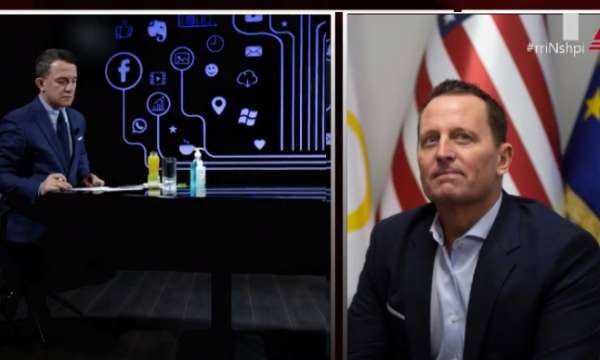

Gazeta Express
27/03/2020 21:27US Presidential special envoy on Kosovo-Serbia dialogue, Richard Grenell, in an exclusive interview with the T7 show Pressing reveals details of his communication with the outgoing Prime Minister of Kosovo, Albin Kurti, saying that the latter promised to revoke tariffs on Serbian goods. “He looked me in the eye and said that he would drop tariffs,” Grenell said. He reiterated the US position that 100 percent tariffs which was introduced before Albin Kurti was appointed prime minister is harming Kosovo’s economy and its people and needs to be dropped.
Read full interview below:
Berat Buzhala: Mr. Grenell, I would like to start this interview with you with the question that preoccupies most of the people in Kosovo right now. Were you too harsh with Mr. Kurti with regards to his position on tariffs?
Richard Grenell: We the United States have had a long-standing position that 100 percent tariffs that have been implemented before Mr. Kurti were harming the economy and the people of Kosovo the most. This is a long-standing policy, this is something that we communicated to every leader before the elections and after the elections, and to be honest, we had the commitment from everyone before the elections that they would commit to drop in the tariffs. Look, this is something that the United States firmly assess across the board, a bipartisan support, that the 100 percent tariffs are harming the economy of Kosovo, So, it does not make sense to us to have a policies that are harming economy, not allowing businesses to move in and create jobs, This affects young people who want jobs and policies are harming the economy itself. We the United States can’t be expected to keep supporting policies that are hurting the people and the job-creation activity. We are focused on helping on the economic side, and I think that there is too much attention focused on the political issues. The Trump Administration, trying to help the dialogue process, we decided a long time ago that the solution in our minds was going to be creating economic incentives, leaving the politics to the politicians and helping the economy. Trump’s economy has been on fire, has been amazing and what President Trump asked me to do is to try and help create economic incentives, pro-business atmosphere so that young people could get jobs. We have seen evidence over and over that businesses, whether be it American businesses or European businesses, were hesitant to come into Kosovo because some of the policies, and because of the perceived problems that were creating blocks basically. Businesses were not willing to come in where there is a perceived crisis.
Berat Buzhala: You said that you had a commitment that everyone before and after the elections that they would drop the tariffs. Did Mr. Kurti commit on this.
Richard Grenell: One hundred percent yes. He looked me in the eye and said that he would drop tariffs.
Berat Buzhala: Why you think he lied to you?
Richard Grenell: Well, look I not going to get involved in politics on what a situation is there, how political leaders respond before and after commitments, but the reality is that we are staying out of politics, we will work with any government that wants to create an atmosphere, where you drop the tariffs and you help create jobs for young people, for citizens that are there. Businesses want to come to that region. It is one of the reasons why, when the Trump Administration got involved and President Trump asked me to be the special envoy, the first thing I did when I arrived in Pristina, the first thing I did when I arrived in Belgrade, was to meet with the private sector community. Not the politicians. I went to the chambers; I went to the businesses and I heard across the board ‘we can’t have normal commerce’ because of these political problems. So, this is why I concentrated as the first thing to get a flight that would include cargo and passengers, not enough of the media were focusing on the cargo aspect of this historic flight between Pristina and Belgrade. This was going to create a way for businesses to move goods across the region very quickly. We have car rental companies who when you rent a car in the region, because of the border problems, people cannot cross the border easily, they cannot go in a rental-car when they thought they can go, this is making businesses suffer. And second that we decided to do was the rail and motorway agreements. These are issues that community business wanted and let me just confront one issue on the railway, because there was an agreement between the leaders in Serbia and leaders in Kosovo on the railway and then later one after it was signed there was questions of the route it was going to take. We have been very clear on this route that we did not have a preference we needed both parties to agree. You can’t have one side wanting one route and the other side wanting a different route. There is a limited fund of the from the Europeans, or Americans that are going to help in financing of these projects. You cannot pick routes that are not feasible for both sides or that are too costly. And so, we did not pick the route, the two parties picked the route. And this is, I feel very strongly not imposing on the two parties’ American solutions. We are trying to be there make sure that we do not waste our money and that want the American people help to finance projects or do certain things that money is not wasted. And so, when the two parties come together and figure out that this is the most feasible route with the limited funds, because the proposed route before was through parts of Serbia that the Serbian Government did not support, that were too expensive to make, and the funds were not just there in terms on how to get through mountainous areas.
Berat Buzhala: Last night Mr. Grenell jointly with the Matthew Palmer and Ambassador Philip Kosnett issued a statement. It was much needed clarification, as throughout last week and especially during parliamentary debate Mr. Kurti and his ministers kept saying that there is a secret deal, and if the reciprocity measures with Serbia are suspended Kosovo is going to lose part of its territory. This issue now appeared settled. But for our audience not to leave any shred of doubt, neither you nor other members of US Government have discussed ever with President Thaci or Vucic the land-swap?
Richard Grenell: Never. It is never been brought up at my presence. As I said, this is not something that I have seen, or has been talked about. And by the way, let me be very clear: I said this a while ago, we said this on Twitter I believe, but we have issued statements certainly to the media when they asked. This is not the first time that we have been cleared this rumour, is just there is a rumour. We have been saying this for a while, but some chose to not believe it. And that is not going be on us. We can just keep stating what we know to be the facts, and the fact is that I have never seen it and it has never been discussed and is just an option.
Berat Buzhala: Do you believe that land-swap is a good option to solve problems with Serbia?
Richard Grenell: I personally don’t. I don’t see that as an option. But I want to be very clear that all these are political issues, we the United States are really concentrating on the economic issues. Our belief is that we can create a different atmosphere, where European and American businesses are coming into the region because the perceived conflict is over, and that we can move businesses into seeing this region as part of their expansion. We create jobs, we create jobs for young people, so the people are moving out of Kosovo or Serbia that they remain there, and the region becomes vibrant. We believe that this is the solution to the political problems, that economic development, job creation, creates hope, creates incentives, and the political issues would become less. You know I must be clear, is that many of the problems are economic-related. And that’s where the energy should be pushed, that’s where we should really all stop fighting and start trying to create jobs in the region, so that’s where we have been focused on.
Berat Buzhala: No it seems that after PM Kurti’s Government lost no-confidence motion, the tariffs on Serbian goods cannot be lifted yet, for a certain period of time, and many people were shocked when the US Development Aid was suspended and the US troops withdrawal was mentioned for the first time. How close were we to lose US support in a fundamental way, Mr Grenell?
Richard Grenell: The American people love the people of Kosovo, we are committed to the people of Kosovo, but when we have policies, we the United States the people of the United States, get to have rules about our assistance. We do not want to be in a position where our assistance is guaranteed no matter what happens on the other side. We fundamentally believe that the tariffs were harming the people of Kosovo and so we have decided to have a US policy that is very strong and said we believe that the tariffs should be unequivocally and immediately dropped because that are harming the people of Kosovo, it is not helping economic development which is their goal, and so we were going to make sure that we all supported, all governmental agencies of the US were going to support that policy. But the fact is that we love the people of Kosovo and we want the tariffs to be dropped so that we can have our bilateral cooperation and work continue.
Berat Buzhala: Was it possible for the US Government to keep working with the former Government?
Richard Grenell: The US Government is going to work with any Government of Kosovo that wants to create jobs and move forward. We stand with the people of Kosovo; we are committed, and we are there. But again, I go back to the US policy gets to be developed by the United States Government and the United States people. And so, when we believe that tariffs, the 100 percent tariffs that are put on by the Government of Kosovo, when we believe that this is harming your economy, you then can’t expect us to keep funding projects that we believe are not going to be effective simply because the tariffs are strangulating the economy. We don’t want to waste our money.
Berat Buzhala: Last two questions. After over a year of inactivity regarding the dialogue between Kosovo and Serbia, few European countries seemed to be animated by your own active agenda and the deals you have facilitated in Munich and berlin on transport. Are you in contact with the European capitals regarding the issue of dialogue?
Richard Grenell: Yes, some who are supportive. And I think that there is a little bit of overplayed because some European individuals and governments and leaders who are very supportive of having this dialogue move forward. I saw incredible support for the historic airline agreement, which we’ve got to finish, and we are focused on finishing that so that it can be implemented. We go great support for the railway and highway agreements. There is no question though that always going to be those few who are going to sit on the sidelines and complain. What we want to do is we want to move forward. I have raised, for instance the visa liberalisation policy directly with the Chancellor Merkel. I have said that this is a policy that needs to be adjusted and that the German Government can definitely help. I raised that last year, I think in November or December, directly with Chancellor Merkel. And she told me directly that there were ways that it could work to adjust that and to help. So maybe on work visas or specifically industry visas and when I raised those points specifically, she said yes there are things that we can do. She instructed her team to do that. I have raised that issue multiple times, I haven’t seen it implemented yet, but we believe that there are things that the Europeans can do, have committed to do, and should do, but haven’t done yet.
Berat Buzhala: Since ’92 at least and beyond, Kosovars did believe in the United States and in White House. Should they keep believing on US and White House?
Richard Grenell: Look, I think that you should believe in the Europeans, you should believe in the Americans we are all together on this. We want to move forward. I firmly believe that there are plenty of people in European and the United States who are join together wanting to make progress and not looking who gets credit or who does what. There is enough to do and we can all help the region.
Berat Buzhala: Last question. What do you expect from new Prime Minister?
Richard Grenell: Look, we are not going get involved in politics. The people of Kosovo got to choose their Government, got to choose their leader, but the United States get to choose its policies. And our policy is very firm, no matter who is in charge. Tariffs must be dropped, because we believe that 100 percent tariffs that Kosovo has, we believe it’s harming your own economy, and we are trying to help Kosovo, Serbia, the entire region in terms of having zone having a region that is about job creation and hope for young people that they can stay in the region and have quality jobs, and have their families glow and prosper. And so, we get to have our own policy and our own policy is very clear: That the tariffs should be dropped and then we can partner and be very creative and broadways.
Berat Buzhala: The very last one. Many who oppose you, have used your sexual orientation, Mr. Grenell – You are openly a gay man – as an argument to undermine your authority and ability to lead this important process. How do you comment on this?
Richard Grenell: I have seen that online and certainly received a lot of messages from people who are trying to use anti-gay or homophobic slurs. I don’t believe that is a majority of the people in Kosovo or in the region. It certainly should be condemned. I am very proud to be gay is the way I was born and so I don’t back away from that, and I think that any anti-gay or homophobic slurs should be widely condemned. /GazetaExpress/
Të tjera nga rubrika

Pamje/ Zhvilluan gara me shpejtësi të rrezikshme, Policia shqipton gjoba ndaj 3 vozitësve në Rahovec
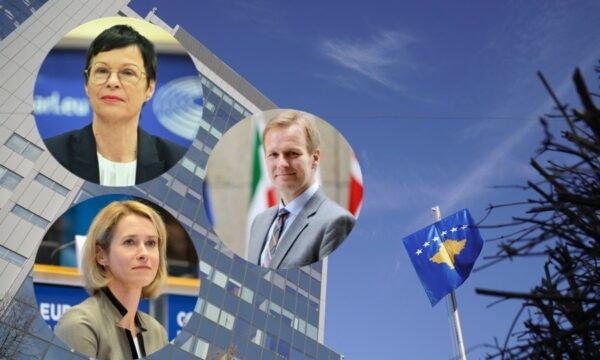
Ambasada gjermane rikujton “ekipin e ëndrrave” që është në Bruksel: Kosova po e priste, tash vetë e paralizuar politikisht
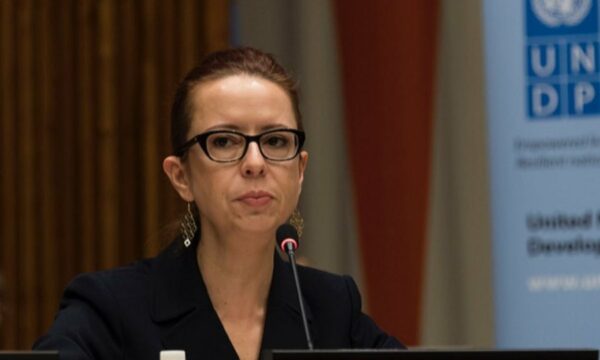
Vajza e Ismail Kadaresë shkarkohet nga detyra si ambasadore në UNESCO

Tërmet në rrethinën e Vitisë
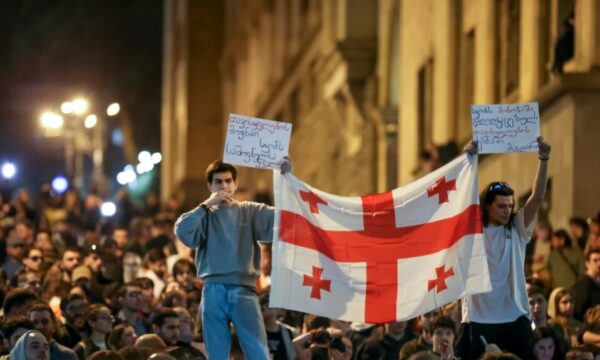
Gjeorgjia rrezikon liberalizimin e vizave, BE: Qeveria po shkel vlerat evropiane
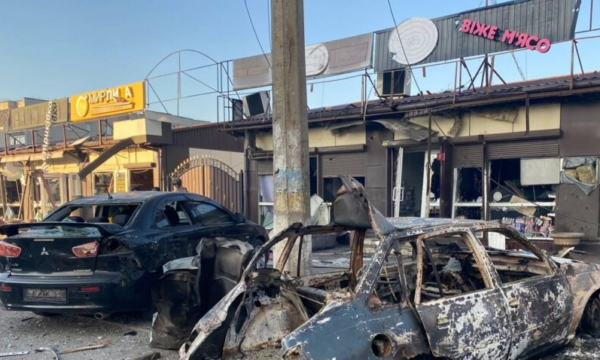
Sulmi rus vret dy persona dhe plagos 27 të tjerë në lindje të Ukrainës
Te fundit

Pamje/ Zhvilluan gara me shpejtësi të rrezikshme, Policia shqipton gjoba ndaj 3 vozitësve në Rahovec

Ambasada gjermane rikujton “ekipin e ëndrrave” që është në Bruksel: Kosova po e priste, tash vetë e paralizuar politikisht

Vajza e Ismail Kadaresë shkarkohet nga detyra si ambasadore në UNESCO

Tërmet në rrethinën e Vitisë

Kur pritet të rikthehet Bellingham?

Gjeorgjia rrezikon liberalizimin e vizave, BE: Qeveria po shkel vlerat evropiane
✕





